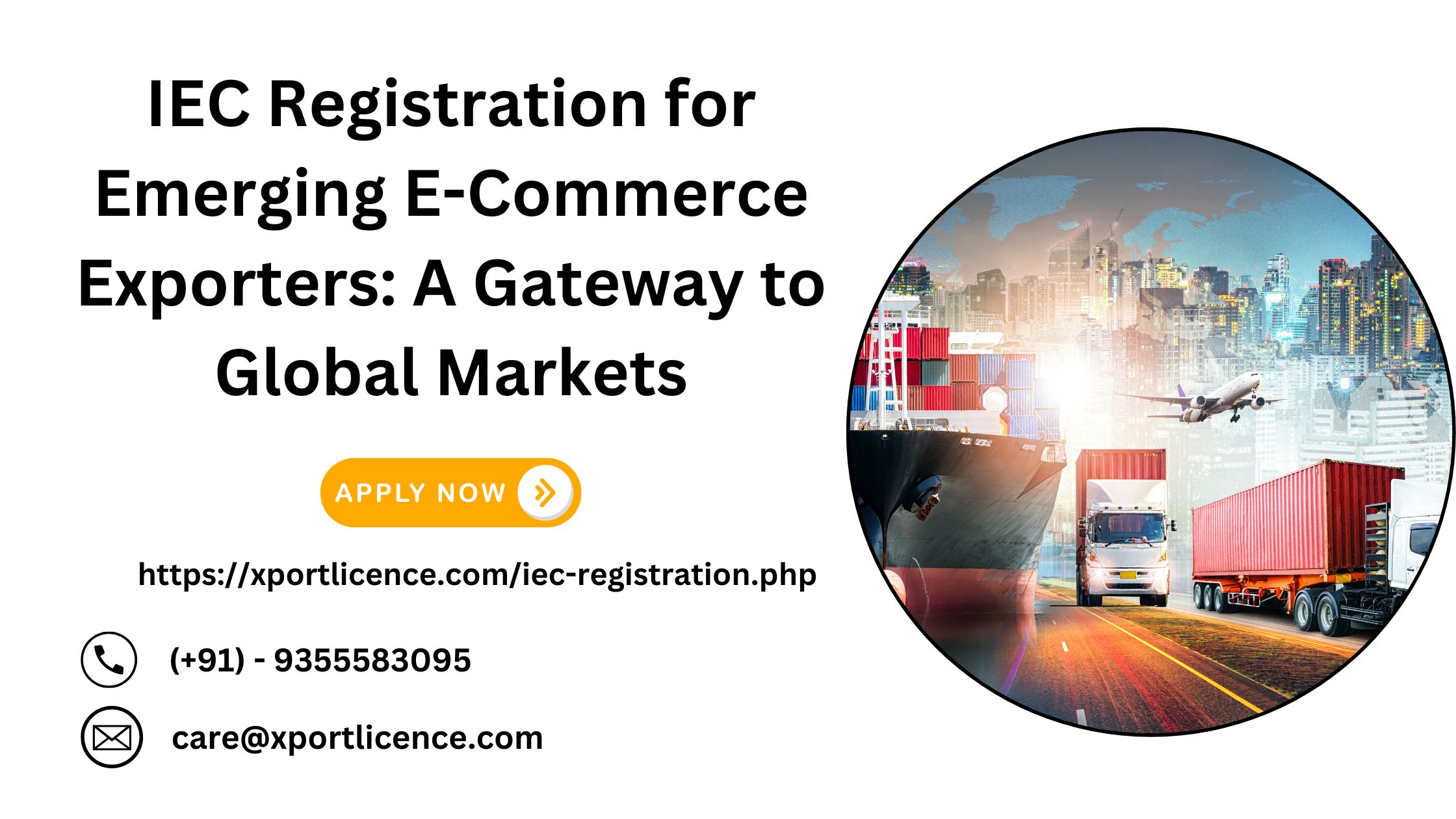IEC Registration for Emerging E-Commerce Exporters: A Gateway to Global Markets
Introduction In today’s globalized economy, e-commerce has revolutionized the way Indian businesses reach international markets. Small and medium enterprises (SMEs),...

Introduction
In today’s globalized economy, e-commerce has revolutionized the way Indian businesses reach international markets. Small and medium enterprises (SMEs), individual creators, and even rural entrepreneurs now leverage digital platforms to export products worldwide. However, to officially enter the global market, one crucial requirement remains: IEC registration.
What Is IEC Registration?
The Import Export Code (IEC) is a 10-digit number issued by the Directorate General of Foreign Trade (DGFT) under the Ministry of Commerce and Industry, Government of India. It is mandatory for any business or individual who wants to import or export goods and services from India.
Why E-Commerce Exporters Need IEC
With platforms like Amazon Global, Flipkart Global, Etsy, Shopify, and Alibaba, Indian sellers can now reach customers abroad without a physical presence. But these platforms often require IEC as a mandatory business compliance to begin cross-border trade.
Unique Relevance of IEC in E-Commerce Exporting
Direct-to-Customer (D2C) Global Sales
E-commerce businesses often bypass traditional distribution chains. IEC registration allows them to legally ship directly to customers worldwide, making the process official and streamlined.
Payment Gateway Integration
Global e-commerce platforms like PayPal, Stripe, or Wise require compliance with export laws. IEC facilitates smooth foreign currency transactions, helping Indian exporters receive payments internationally without legal hassles.
Cross-Border Shipping Support
Logistics providers like FedEx, DHL, and India Post often demand an IEC for customs clearance when shipping internationally. IEC simplifies documentation at ports and customs.
GST and Tax Benefits
With IEC registration, exporters can avail benefits like GST refunds on exports and incentives under schemes such as MEIS (Merchandise Exports from India Scheme) and RoDTEP (Remission of Duties and Taxes on Export Products).
Who Can Apply for IEC in the E-Commerce Space?
IEC is not just for large corporations. It can be obtained by:
- Individual entrepreneurs
- Small online retailers
- Dropshipping businesses
- Freelance designers and artists
- Social media sellers (on Instagram, Facebook, etc.)
- Handicraft sellers in rural areas
Even if you don’t own a company, sole proprietors can apply using their name and PAN card.
IEC Registration Process: A Step-by-Step Guide
Access the IEC Portal: Open the official IEC registration website on your browser.
Complete the Online Form: Enter accurate business details such as your enterprise name, business type, PAN, address, and contact information in the IEC application form.
Review and Submit: Double-check the filled-in information for accuracy and completeness, then proceed to submit the form digitally.
Make the Payment: Pay the required registration fee via online modes—net banking, UPI, or credit/debit card.
Authenticate via OTP: For security purposes, an OTP (One-Time Password) will be sent to your registered mobile number or email. Enter it to validate your submission.
Application Under Review: The Xportlicence.com team will verify your documents and application details before approving the request.
Get Your IEC Code: Once verified and approved, your unique 10-digit IEC code will be issued and delivered to your registered email, usually within 1–2 working days.
Key Benefits for E-Commerce Exporters
Global Expansion
IEC registration is the first legal step towards scaling an online business globally, without requiring a large capital investment.
Eligibility for Export Incentives
Businesses with IEC can avail benefits under government schemes such as:
- Export Promotion Capital Goods (EPCG)
- RoDTEP Scheme
- Interest Equalization Scheme
Official Proof of Export Legitimacy
Having an IEC builds credibility and transparency with global buyers and platforms. It shows you’re a registered and compliant exporter.
Banking Compliance
IEC enables exporters to receive foreign remittances through authorized banks, as per RBI guidelines. It’s essential to open a current account for export activities.
Easy Custom Clearance
Whether shipping a single product or bulk orders, having an IEC expedites the customs clearance process through recognized documentation.
Tips for Smooth IEC Registration for E-Commerce Startups
Use a business bank account – even if you’re a sole proprietor.
Double-check your PAN details – it must match exactly with the Aadhaar or identity proof.
Keep digital copies clear and legible – avoid document rejection.
Link your IEC with AD Code – for bank compliance and customs clearance.
Don’t forget to update IEC every year – failure to do so results in deactivation.
Note:- Now you can easily update and renew the iec code online
Conclusion
For Indian e-commerce exporters, IEC registration is more than just a legal formality. It’s a gateway to the global marketplace, ensuring your business operates smoothly across borders.
Whether you’re a young designer selling digital art abroad or a rural entrepreneur exporting handmade jewelry, IEC unlocks the world one shipment at a time. It’s simple, low-cost, and essential for any e-commerce seller who dreams of going international.





